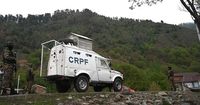In a tragic turn of events, a terrorist attack in Pahalgam, Jammu and Kashmir, has resulted in the deaths of at least 26 people, predominantly tourists. This incident, which occurred on April 22, 2025, has raised tensions between India and Pakistan, with both governments reacting strongly to the violence.
The attack was executed by gunmen linked to The Resistance Front (TRF), a proxy group of the Pakistan-based Lashkar-e-Taiba (LeT). It is reported that the assailants opened fire on a crowd near a meadow close to Pahalgam town in Anantnag district, injuring dozens more in what is one of the deadliest attacks in the region since the infamous Pulwama incident in 2019.
In the wake of the attack, the former Pakistani Minister Chaudhry Fawad Hussain urged for national unity among Pakistani political factions, fearing retaliation from India. "Pakistan is politically divided, but we stand united as a nation. If attacked or threatened by India, all groups will rally together under the Pakistani flag to defend our homeland," Hussain stated on social media platform X.
Indian officials have vowed a strong response to the attack. Union Defence Minister Rajnath Singh declared that India would not only eliminate the attackers but also target those who orchestrated the plot from across the border. Prime Minister Narendra Modi referred to the incident as a "heinous act," promising that the terrorists would not be spared and that India's resolve to combat terrorism is unwavering.
The attack has drawn comparisons to past incidents, particularly the Pulwama attack, which led to an Indian Air Force strike on a terror camp in Pakistan-occupied Kashmir. The current situation has raised questions about the potential for military escalation between the two nuclear-armed neighbors.
Pakistan's response to the Pahalgam attack has been to label it a "false flag drama," suggesting that India may have orchestrated the incident to justify military action against Pakistan. This assertion reflects a pattern of accusations that often surface following such violent events. A provincial minister in Pakistan claimed, "This is yet another cowardly attempt, just like the ones India has made in the past, aimed at falsely accusing Pakistan."
In a broader context, the timing of the attack coincided with significant diplomatic events, including a visit from U.S. Vice President JD Vance and Prime Minister Modi's historic trip to Saudi Arabia. Observers note that major terror attacks have frequently coincided with high-profile visits by foreign dignitaries, suggesting a strategic motive behind the timing.
As political leaders in both countries react to the aftermath of the attack, the pressure mounts for decisive action. In India, public sentiment is leaning towards a military response, with many citizens expecting the government to act against terrorist bases and their sponsors in Pakistan. The expectation is heightened due to previous military actions, including the Surgical Strikes in 2016 and the Balakot air strikes in 2019, which have set a precedent for retaliation against terrorist threats.
However, the Indian government faces a dilemma. If it chooses not to respond militarily, it risks losing political support and undermining the deterrence established by previous strikes. Conversely, escalating military action could lead to a broader conflict, raising the stakes for both nations.
The implications of the Pahalgam massacre extend beyond immediate security concerns. The attack has already begun to impact the region's tourism industry, a vital source of income for many Kashmiris. As violence continues to overshadow the region, the livelihoods of those dependent on tourism are at risk.
Furthermore, the ongoing geopolitical dynamics complicate the situation. Observers point out that Pakistan, facing internal pressures and seeking to bolster its military standing, may use such incidents to rally national sentiment against India. The rhetoric from Pakistani officials suggests a readiness to deflect blame and accuse India of aggression, which could further escalate tensions.
As the situation unfolds, it remains to be seen how both governments will navigate the crisis. The potential for military escalation looms large, and the international community watches closely, aware that any miscalculation could have far-reaching consequences.
In summary, the Pahalgam attack has not only claimed innocent lives but also reignited longstanding hostilities between India and Pakistan. Both nations are now at a crossroads, with the decisions made in the coming days likely to shape the future of their tumultuous relationship.






